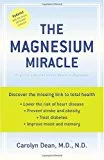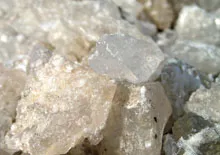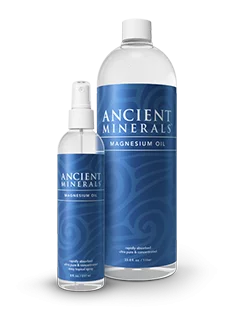The Master Magnesium Compound
What is magnesium chloride? Magnesium Chloride (mg chloride) is recognized by many medical professionals as the “Master Magnesium Compound” for both dietary and topical uses, due to its high potency and efficient action.
What is magnesium chloride used for? Magnesium chloride is an essential mineral and is undeniably therapeutic to the human body.
Not all types of magnesium deliver the same recognizable benefits. Like other vitamins and minerals of nutritional value, magnesium occurs as various inorganic and organic forms in nature. Each of these forms has varying degrees of efficiency in human biochemistry.
- In supplement form, magnesium oxide, the most common form of magnesium sold in medication by pharmacies and drug stores, has been shown to have as low as a 4% absorption rate. 1
- Other forms of magnesium, especially the naturally occurring magnesium chloride, have been demonstrated to achieve much greater bioavailability. A magnesium chloride supplement will be the best and most bioavailable magnesium.
- Magnesium chloride is also safe for men, women, children, and during pregnancy.
- The use of magnesium chloride can also help the body process and absorb another essential mineral, calcium.
- Magnesium has also been shown to contribute to a healthy heart, normal blood pressure levels, strong bones.
Magneisum can be found in many foods, but with less nutrient dense soil, many seek support from supplements. Choosing a highly soluble form of magnesium brings both high potency and superior benefits toward health. For fast-acting therapeutic use, a magnesium chloride supplement is especially recommended. Is magnesium chloride safe? One particularly safe and natural form is now available in a pure, unadulterated magnesium chloride oil or as magnesium chloride bath salts, both extracted from a pristine ancient sea bed and tested free of contaminants.
Why Magnesium Chloride?


Stability constants range from values less than one to values under twenty. With regard to forms of magnesium supplements, the closer the stability constant is to zero, the more bioavailable the supplement. Lower stability constants represent soluble complexes, more easily broken down into ionic form for bioavailability. This is important, as we assimilate magnesium not as the magnesium chloride compound, but rather as free magnesium and chloride ions.
Stability Constants of Common Magnesium Compounds
The following chart lists the stability constants of some common magnesium compounds, with lower stability constants reflecting higher bioavailability: 2 3
| Magnesium Complex | Stability Constant |
Ionization |
|---|---|---|
| Magnesium chloride | 0 | [totally ionized] |
| Magnesium acetate | 0.51 | [essentially ionized] |
| Magnesium gluconate | 0.70 | [essentially ionized] |
| Magnesium lactate | 0.93 | [essentially ionized] |
| Magnesium malate | 1.55 | [essentially ionized] |
| Magnesium glutamate | 1.90 | [essentially ionized but neurotoxic] |
| Magnesium aspartate | 2.43 | [essentially ionized but neurotoxic] |
| Magnesium citrate | 2.80 | [essentially ionized] |
Source: Doctor Carolyn Dean, M.D., N.D. The Magnesium Miracle. New York: Ballantine Books, 2007; stability constants from http://george-eby-research.com/html/stability_constants.html
Magnesium chloride potency is clearly revealed in this data. With a stability constant of zero, magnesium chloride is completely ionized across a wide pH range–from a low pH of 2 to 3, found in stomach acid, to the slightly alkaline physiologic pH of 7.4, found in the main extracellular body fluids such as serum and lymph. 4
Notably, the natural pH of the skin mantle is a mildly acidic 4.5 to 6, creating an ideal environment for total ionization of magnesium chloride. Thus optimal uptake into underlying tissues is possible with topical magnesium chloride us, as found in transdermal magnesium therapy.
Magnesium Chloride Benefits Digestion
As to the success of magnesium chloride supplements for health via oral supplementation, the benefits are admirable. Many researchers advocate magnesium chloride as the most effective form of dietary supplementation, in part due to the vital role that chloride has in the production of hydrochloric acid in the stomach.
Magnesium chloride supplements play a vital role in the production of hydrochloric acid in the stomach.
Some people simply do not produce enough hydrochloric acid (HCl), which can result in a number of health issues related to metabolism and nutrient absorption. These deficiencies can be due to various disorders that affect the stomach, or simply due to individual differences or reasons unknown. As we age, production of HCl in the stomach declines, often dramatically, and is nearly always left undiagnosed.
Intake of magnesium chloride and its use as a magnesium chloride supplement has the added benefit of helping to reduce many potential problems that could arise from steadily declining secretions of gastric acid in the stomach.
These can include:
- Mal-absorption of vitamins and minerals
- A failure in proper digestion
- An increased susceptibility to unwanted bacteria, viruses, and yeasts passing through the gut
These advantages come from the extra chloride found in magnesium chloride, enough to increase production of gastric acid, thereby enhancing absorption and assimilation of magnesium itself, and improving overall digestive efficiency — creating an ideal environment for the assimilation of critical micronutrients important to health, especially as we age.
Efficacy of Magnesium Chloride Oil Preparations
Magnesium chloride potency and efficacy is particularly achieved when applied topically to the skin in a form known as “magnesium chloride oil”. Positive reports from medical professionals and consumers regarding the health benefits achieved from using topical magnesium chloride highlight its convenience and its effectiveness in addressing a variety of symptoms including those related to the skin, muscles and nervous system.


Supporters of Ancient Minerals magnesium chloride describe in detail the immediate and profound impact that topical or “transdermal” magnesium has had on their health, where oral dosages of various magnesium compounds have fallen short of their expectations.
A small study conducted by Dr. Norman Shealy, M.D., founder of the American Holistic Medical Association, provides documented research on the effect of topical magnesium chloride on blood chemistry. Dr. Shealy compared intracellular magnesium levels of participants before and after a period of daily application of topical magnesium, via magnesium baths and spray application of magnesium chloride oil.
With 75% of participants showing marked improvement, Dr. Shealy concluded that the unique properties of supersaturated magnesium chloride allow it to be absorbed effectively into the skin, raising intracellular magnesium levels in the majority of individuals.
Magnesium Potency and Assimilation
Commonly asked questions among professionals and consumers includes, exactly what percentage of Ancient Minerals magnesium chloride oil, gel, lotion or flakes is absorbed by the skin? And, how effectively are topical preparations of magnesium chloride absorbed in comparison to oral use?
Fick’s Law of Diffusion states that the amount of any solute absorbed (e.g. magnesium chloride oil) is directly dependent upon:
- The concentration of the solution
- The length of time the solute is in contact with the membrane (e.g. the skin)
- Additional variables, including application sites on the body, temperature of the solution, etc.
While these points do provide insight into the conditions which would favor effective uptake of magnesium by the skin, in terms of a definitive answer as to precisely how many milligrams are absorbed is of course unattainable in vivo. Exact values are similarly unattainable when oral dosages are called into question. Far too many intrinsic factors exist to influence exactly how much and how fast magnesium is assimilated and subsequently sent into circulation, whether via the oral or topical route.
However, the clear-cut efficiency of the skin for mineral uptake coupled with the broad benefits of magnesium chloride in topical applications certainly provides a well-laid foundation for rapid results to the user. What is measurable are the effects on blood chemistry as demonstrated in Dr. Shealy’s study, along with immediate improvements in one’s health from restoration of magnesium deficient cells.
When asked, what is magnesium chloride good for, the advice from those who have experience with topical magnesium therapy generally is:
Magnesium chloride arguably delivers more usable magnesium to cells than any other treatment form, especially when the skin is used as a primary path of entrance.
Shortfalls in Oral Magnesium Supplements
It’s important to note that oral magnesium presents unique challenges for many individuals. For many, these challenges become barriers to restoring intracellular magnesium levels effectively.
Magnesium oxide, common in popular dietary supplements, could have a fractional absorption in the gut as small as 4 percent, which can prevent one seeing the benefits needed.
Firstly, realistic absorption rates from oral magnesium supplements are rarely taken into account when dosage recommendations are given. Usage of poorly ionized forms of magnesium can therefore result in ineffective supplementation. A study in 2001 indicated that magnesium oxide, an inexpensive magnesium complex included in many popular dietary supplements, could have a fractional absorption in the gut as small as 4 percent. 5
If one was to ingest the commonly recommended (albeit modest) adult dosage of 300-400 mg magnesium per day in this poorly absorbed form of medicine, it could equate to a usable dosage of only 12-16 mg.
Secondly, and perhaps more important, is the fact that nearly all magnesium supplements share a common tendency to create a laxative effect in the bowels. The effect of different magnesium compounds on bowel motility and stool softness is further amplified with the quantity ingested in a single dose.
The higher any single dosage, the greater the potential to cause diarrhea, thereby reducing transit time through the bowels. This is of key importance, and as Dr. Shealy indicates in his book Holy Water, Sacred Oil: The Fountain of Youth, there is reliable evidence to indicate that absorption relies heavily on magnesium’s staying power in the intestine–at minimum 12 hours. If transit time is reduced to less than 12 hours, the percentage of magnesium absorbed may be drastically impaired.
When these points of consideration are taken in conjunction with the unpredictability of each individual’s efficiency to absorb magnesium through oral means, the results become unreliable in many cases. In contrast, bypassing the digestive system with topical use of magnesium oil, lotion or gel — or other transdermal therapies including magnesium baths or foot soaks — circumvents the many common drawbacks (nausea, diarrhea, etc.) that can accompany oral supplementation.
Magnesium Chloride Uses
A quick search of Pub Med yields thousands of scientific studies highlighting the benefits of various magnesium compounds in human biochemistry. From migraines and pain management to depression, anxiety, sleeplessness and memory, magnesium has clearly demonstrated enormous versatility as a healing mineral.
However, magnesium chloride has expressed unique characteristics beyond the scope of other inorganic magnesium salts that are of special interest. As discovered in 1915 by French surgeon Pierre Delbet, M.D.:
- The application of a magnesium chloride solution to external wounds had favorable effects over leucocytic activity and phagocytosis, making it ideal for wound cleansing.
- Oral magnesium chloride was a powerful immuno-stimulant, exhibiting a broad tonic effect on the host.
Thirty years later, another French doctor, A. Neveu, M.D., used magnesium chloride orally for a broad spectrum of disorders benefiting from the immune bolstering effects that magnesium chloride offered. 6
Dr. Jose Perez Albela Beraun, M.D., director of the Instituto Bien de Salud in Lima, Peru, is a zealous supporter of magnesium, where magnesium chloride is the form used almost exclusively in his work. Dr. Albela spreads the word of magnesium chloride and health through his various radio shows, public lectures, and colleagues, and in fact manufactures and distributes single dose packets of magnesium chloride, often giving them away to the needy. Success stories from the patients of Dr. Albela could fill an entire book. 7
Magnesium oil, liquid magnesium, and magnesium spray — all names which refer to a concentrated solution of magnesium chloride applied to the skin — are the new darlings of many holistic health professionals. Dr. Carolyn Dean, M.D., N.D., describes the unique benefits of topical magnesium chloride oil:
A very exciting addition to the magnesium family is a product loosely referred to as magnesium oil. It’s not actually an oil at all, but a super saturated solution of magnesium chloride. Magnesium oil can be sprayed or rubbed on the body, and is readily absorbed through the skin. It helps to greatly increase the amount of magnesium in body tissues and overcomes the problems and adverse effects that some people have with loose stools when they try to take enough magnesium to meet their needs. This can be especially important in cases of severe magnesium deficiency that were only treatable with IV magnesium before magnesium oil came along.” 8
Since not all magnesium supplements are equal, it pays to consider the efficiency of various forms of magnesium before choosing the one that’s right for you.
The fast-acting ability of topical magnesium chloride to deliver magnesium beyond that possible with oral forms makes it ideal for restoring optimal health.
Read Health Benefits of Magnesium for additional magnesium chloride health benefits.


